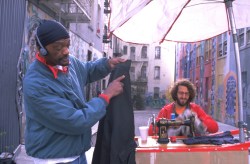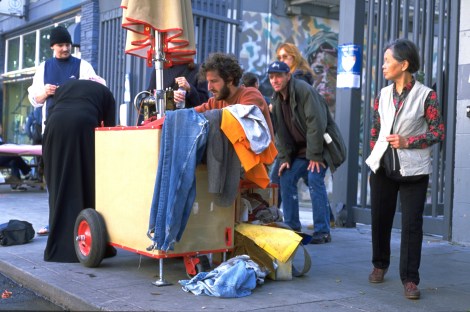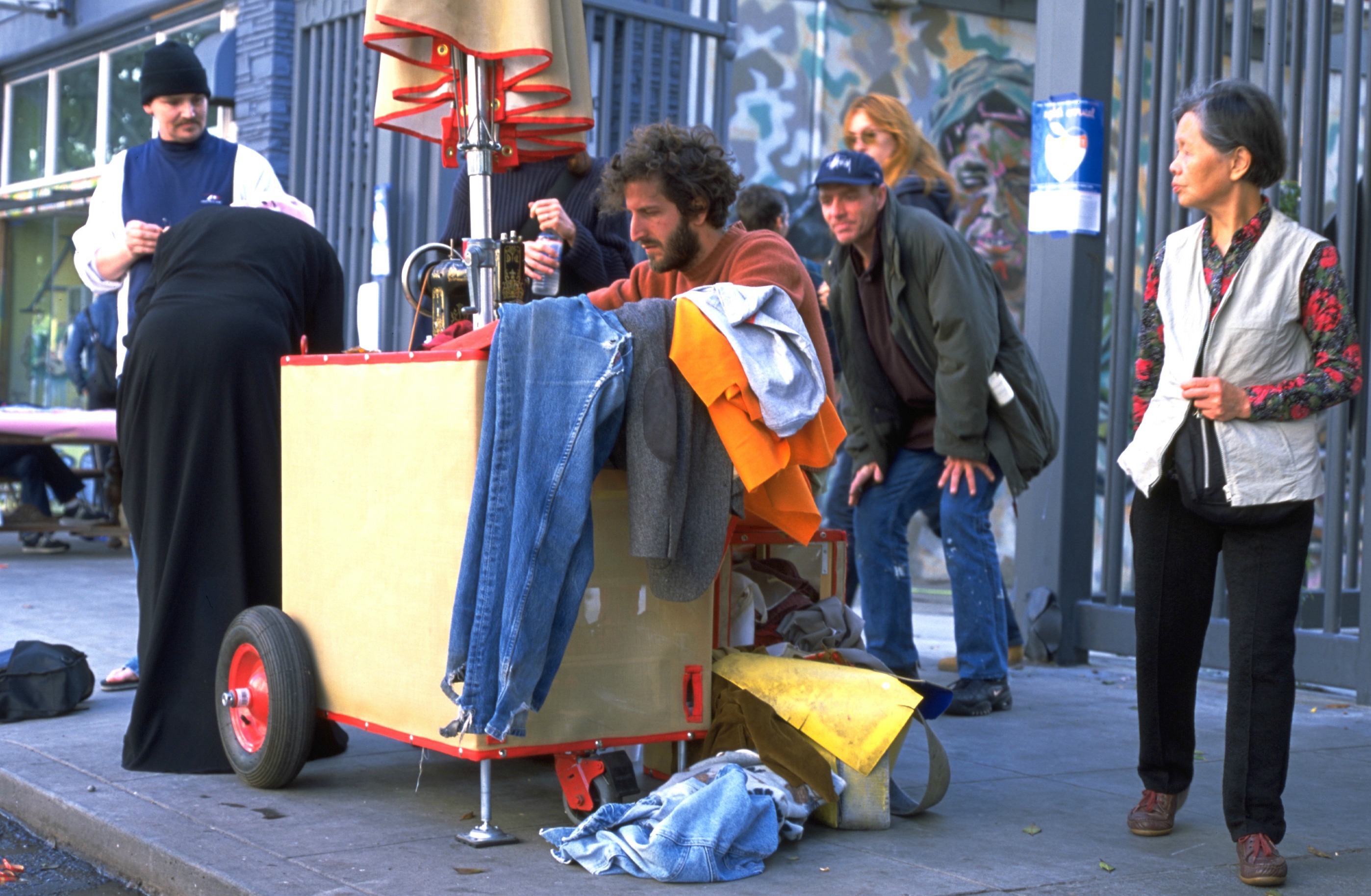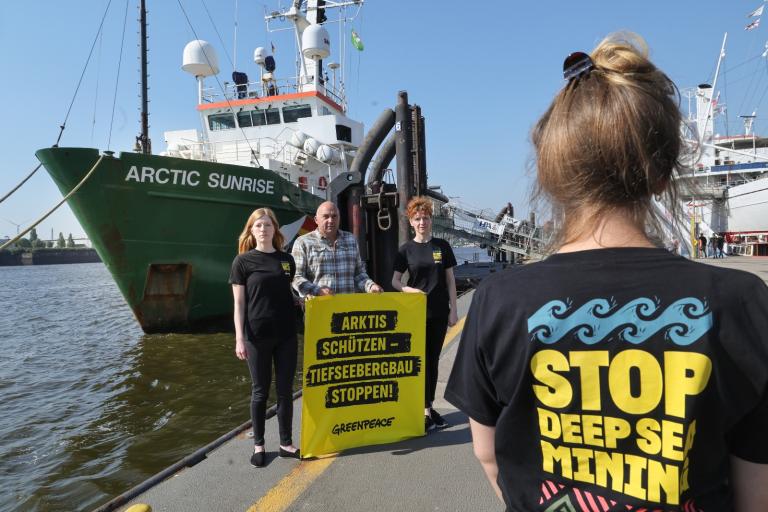
Daniel GorrellThe Luggage Store lets Swaine keep his cart inside, so he only has to roll it out into the alley every month.
Once a month for the past 11 years, Michael Swaine has mended clothing for free on the San Francisco streets.
At first, he did a five-mile route through the city, from dusk to dawn, with a sewing machine covered by an umbrella on wheelbarrow wheels. He loved the route, but it was exhausting and often folks didn’t have their torn clothes with them when he rolled by. He eventually settled at the Luggage Store, a nonprofit artist collective in the Tenderloin District, a tougher part of town. He’s so committed to the project, the Free Mending Library, that he’s only missed three months out of more than 130.
Swaine is an artist, an active member of Futurefarmers (a loose collective of artists, designers, farmers, and computer programmers), and a ceramics instructor. “Most people think of me as a fibers artist. Or a social artist,” he says in a video. “There’s all sorts of strange words [that] people say to me. I try to ignore them.”
I first came across Swaine in Fashion and Sustainability: Design for Change, a wonderful little book about the folks who are rethinking fashion and trying to create a more sustainable clothing industry. Swaine took the time to chat with me about the beautiful things that happen on streets, our throwaway culture, and the strangest thing he’s ever fixed.
Q. What exactly is the Free Mending Library?
A. Everyone is welcome. Everyone is welcome to bring something to be mended — and equally people are welcome to come and help mend. Those are the days that I love the most, when there’s a really wonderful balance — people coming to help mend, people sitting and telling stories, people bringing things to be mended. It’s nice when all of those things are happening at once.
Q. I love the guy who has six pairs of the same black Levi’s and you’ve fixed each pair several times. What’s the community like that’s sprung up around this?
A. There are a lot of regulars. Veronica is one of my favorite regulars. I think Veronica has missed six times in the 11 years. She usually brings a cart or a suitcase with like 30 different items in the suitcase. I usually can only mend approximately 30 things. And usually I have a big pile of all sorts of repairs from all sorts of different people. I always [say], “Veronica, you brought a lot of stuff. There’s no way I can do all of these. Pick your favorite ones, and I’ll work on those.”
Veronica has said, in passing, “Oh, thank you so much for letting me stay here because I don’t have anyone to talk to and it’s so nice that you listen to me.” I believe that this big pile of clothes that she brings is her way of me never being able to say, “I finished your things, Veronica. You can go home now.”
The truth is, I love when people stay. I bring chairs out. I never try to kick anyone out. Maybe it’s kind of like a consumer thing. When you go to a restaurant and you finish eating, you should leave. Someone else will want that chair. I think there’s something touching and beautiful about this other function. I love the sidewalk. I love the street. I love things that happen out on the streets. I believe in creating a scenario where you let things unfold. And I think what unfolded here is this kind of situation where Veronica has lots of things that she needs mended, but she also really needs someone to listen to her, and someone to talk to.
Q. What’s the hardest or strangest thing you’ve repaired?
A. Veronica has also brought me the most interesting repairs. At some point she brought a newspaper clipping that had a picture of Jackie Onassis. And, you know in Jackie O.’s glamour, she had this amazing fur coat. Veronica brought a normal hoodie and a piece of fur that she had found off the street and asked “Can you sew this fur onto my hoodie so that I look like Jackie Onassis? Here’s the newspaper clipping so you have something to work from.”
Q. Did you pull it off?
A. I did my best. I think we did OK. That’s another reason I treasure my relationship with Veronica. She makes it fun. She doesn’t have a job. She kind of lives on SSI [Supplemental Security Income] and knows all the places to get free food. She’s a survivor and she has a really tough life. And at the same time, she has an aesthetic. She wants to look a certain way.
Q. The project started out as Reap What You Sew. How has it changed since becoming the Free Mending Library?
A. When I came up with the term “Free Mending Library,” I printed library cards and handed the cards out to a lot of the regulars. It was my gesture of trying to make it have that feeling of, anyone can come, anyone can participate, anyone can help — open it up a little bit. That wasn’t as successful as I was hoping.
But the concept of the Free Mending Library is my gesture of trying to have it be less about me. It happens in little moments. Sometimes there are big discussions around the sewing machine. Because of how it started, and because I’m good with the treadle sewing machine, I am intentionally and unintentionally the center. I look forward to a moment where it falls away from that. Sometimes a class comes and visits. Sometimes there’s an old lady from the neighborhood who knows how to use the treadle and I can take a break and eat my Vietnamese sandwich and then the woman from India can take over for a while. It happens in moments and I love those moments.

Daniel Gorrell
Q. How else can you see the project morphing?
A. It’s still a growing, changing project. The Tenderloin is a place where there’s a lot of people trying to get out of a situation where they don’t have a job, or they’re in the wrong job. How great would it be if, one of the months, it was like, OK, we’re gonna focus on mending people’s resumes? Bring your resume in and we’ll have people who are good writers come in and help you reword things. I’m interested in stretching what mending could be.
Q. Is it strange to you that no one knows how to mend anymore?
A. My mom is an amazing craftsperson. She can mend anything. And she’s kind of a practical older woman. [When I was younger] I said things to my mom, like, “Oh, mom, can you fix this for me?” She would say, “Oh, Michael, it’s tattered. Just get a new one.” I think it was partly out of her wanting me to maybe be more presentable than sometimes I am. But stuff is so cheap now, and people’s time has been kind of sucked away from us. We have less and less free time. So I see the reason behind this new world we live in, where no one knows how to mend, and it’s a throwaway culture. Also with companies, that’s one of their lessons, their rules — they don’t want it to last forever, because they want you to buy something else. Hopefully we can have more of those moments of mending, whether it’s your resume, or your car, or your shoes.
Q. What’s your advice for people who are inspired by you but lack the time, social skills, or materials to do something similar?
A. First of all, I don’t know if you know the term “Copyleft.” But the Free Mending Library is not copyrighted, it’s copyleft. Anyone can start their mending library, anywhere. There have been lots of mending libraries before me and I hope there’ll be lots after me.
The second thing I’d say is doing something once a day is really difficult and it takes a lot of persistence and commitment to that thing. And most of the things we do once a day are work-related because we need money. It’s not a huge commitment to do something once a month. Sometimes we think that we want to do this big thing, and have this huge implication. A lot of people burn out — or never start. I think there’s something about a small commitment of once a month that actually makes things seem more possible.
Maybe someone wants to mend things, whether that’s clothing or something else, and then says, “Oh, I’m not good enough,” or “I don’t know how.” [My friend] studied fashion and she told me at one point, “One of the best ways to learn something is to take something apart.” Mending is often not as hard as it looks — there’s a whole range of how good you can be at it. But the more you take something apart, learn from that thing, and put it back together … there is definitely power in taking things apart.
The Free Mending Library meets on the 15th of every month at the Luggage Store on 509 Ellis Street.



